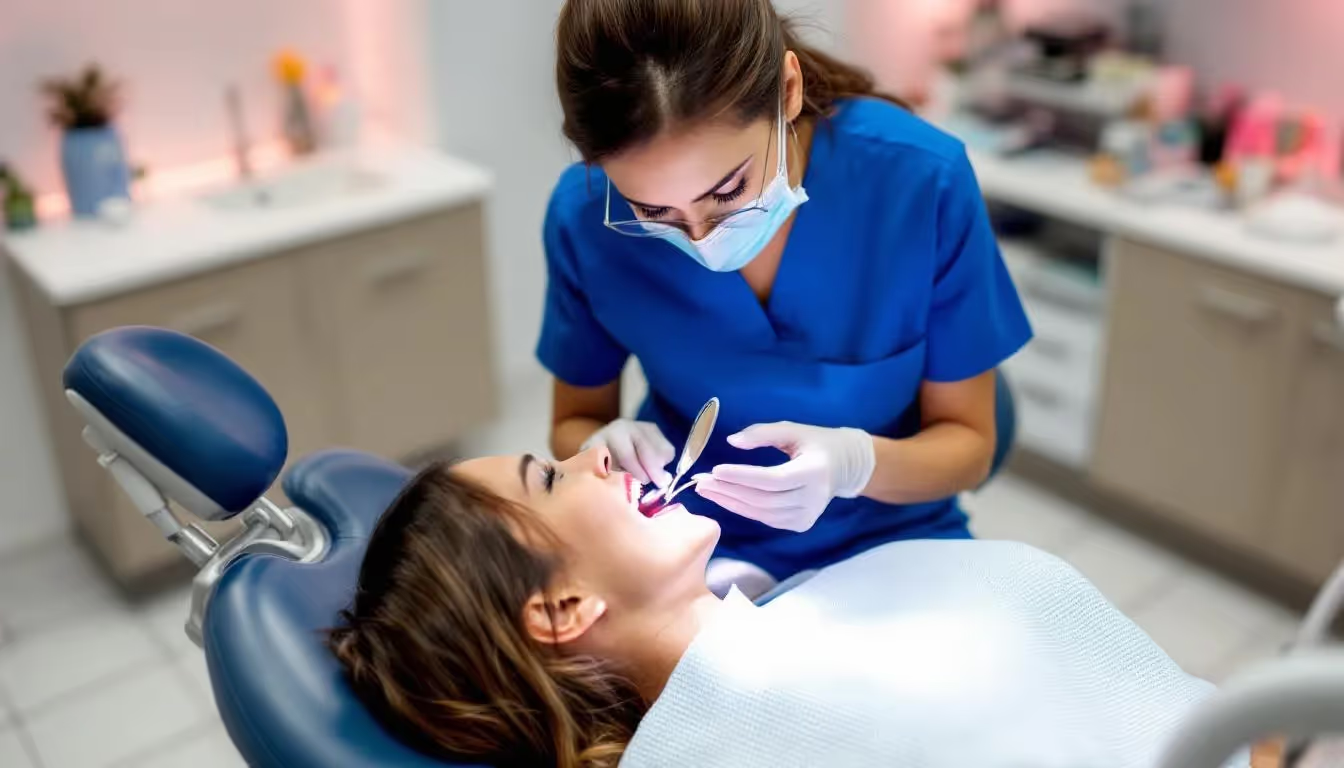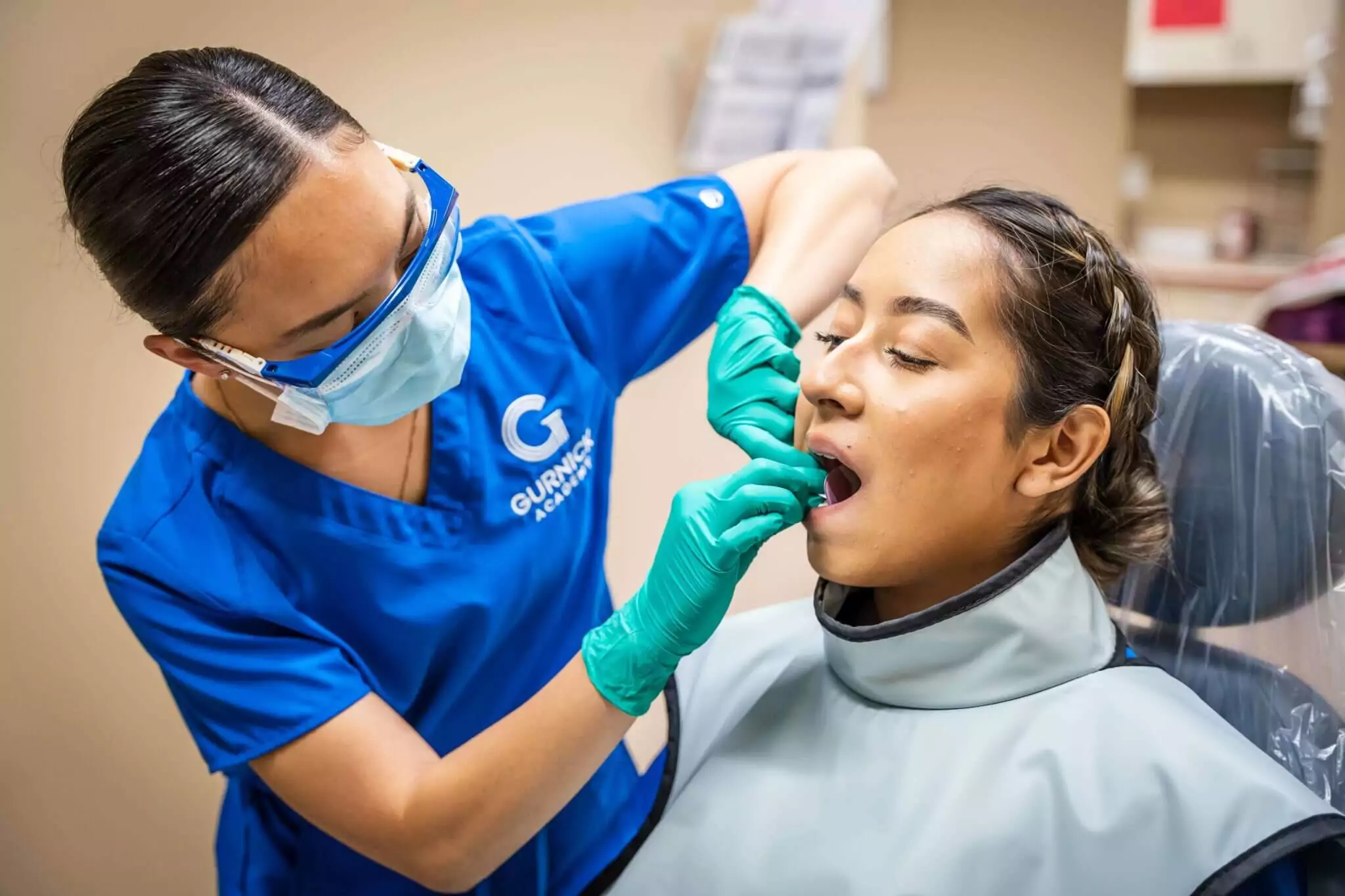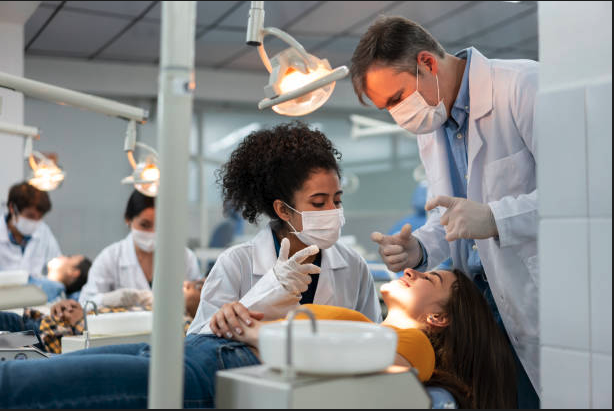Table of contents
Get Started with Kwikly
Get the latest updates, insights, and exclusive content delivered straight to your inbox.
If you're wondering whether dental hygiene school is hard, here's the honest answer: yeah, it can be. The coursework doesn't mess around, and trying to balance clinical work with studying takes some serious dedication. But here's the thing – if you're thinking about it, you can probably handle it. This article will give you the real deal on what makes dental hygiene school tough and some practical ways to get through it without losing your mind.
What You Need to Know
- If you want to become a dental hygienist, you’ll need at least an associate's degree, which is the minimum requirement to enter the field. Earning a bachelor's degree can provide more opportunities, higher earning potential, and options for specialization or non-clinical roles. You’ll also have to pass licensing exams—specifically, board exams—and obtaining the certification required is essential before you can start practicing.
- Dental hygiene school is no joke and you’re going to need to get your time management game together while taking care of yourself so you don’t burn out.
- The good news? The job outlook is pretty great, with 9% growth expected and a median salary of $94,260, so it’s worth the effort.
- Completing a dental hygiene program is a significant commitment, requiring dedication, hard work, and the ability to balance intensive coursework with other responsibilities.
What Dental Hygienists Actually Do

If you’re a dental hygienist, you’re basically a key player on the dental team. You’re the one who:
- Checks patients for oral diseases
- Helps people keep their mouths healthy with preventive care
- Cleans teeth (obviously)
- Teaches patients how to take care of their teeth properly
You’ve got options when it comes to where you work. Sure, most people think dental office, but you could end up in physician offices or government facilities too. It’s nice to have choices.
Here’s something cool – you’re not just following orders. You actually work with dentists to figure out the best treatment plans for patients. You’re hands-on with all kinds of tools, from basic hand instruments to the fancy power stuff.
The preventive care part is huge. You’re basically helping people avoid bigger problems down the road by teaching them how to keep their mouths healthy. It’s like being a teacher, but for teeth.
Hands-on experience is essential in this role, and working as a dental assistant before becoming a dental hygienist can be super helpful for those entering the dental hygiene field, as it provides valuable patient care and workflow preparation.
The dental hygiene field is a growing and rewarding career option, offering strong job growth, competitive salaries, and opportunities for advancement. Path to Becoming a Dental Hygienist
How You Actually Become One

So you want to be a dental hygienist? The minimum you need is an associate’s degree from a program that’s actually accredited. Most colleges require you to complete prerequisite classes, including general education courses and science prerequisites like college algebra, before applying. But if you want more options later, a bachelor’s degree in Dental Hygiene gives you more to work with.
Make sure the program you pick is accredited – this isn’t the time to cut corners. Dental accreditation ensures the program meets the standards necessary for dental hygiene graduates to become licensed. You’ll get a mix of lab work, clinical experience, and classroom time. These classes are designed to prepare you for passing exams and taking board exams required for licensure. After that, you’ve got to pass national and state licensing exams. It’s not optional.
Getting into these programs can be competitive. A lot of places want you to observe dental procedures first, which makes sense. You need to know what you’re getting into. Gaining experience as a dental assistant is super helpful and can give you an edge in the application process. Here’s what they usually want to see:
- High school biology and chemistry (hope you paid attention)
- Some observation time in dental offices
- Experience if you’ve got it
- Test scores
Putting in extra effort in challenging science courses can improve your chances of being accepted.
The programs cover everything – anatomy, radiology, hands-on clinical work. High grades in your prerequisite course work are important for being accepted. When you’re done, you’ll actually know what you’re doing.
Completing all required prerequisite courses and performing well in each course is essential for admission to dental hygiene school and future success.
Applying to Dental Hygiene School
Getting into dental hygiene school isn’t just about wanting it—it’s about being prepared and knowing what each program expects. Most dental hygiene programs are competitive, with lots of aspiring dental hygienists applying for a limited number of spots. That means you need to stand out.
Start by researching every dental hygiene school you’re interested in. Each hygiene program has its own set of requirements, so don’t assume they’re all the same. Most dental hygiene schools want to see that you’ve completed specific prerequisite courses, like anatomy, physiology, and microbiology. You’ll usually need a minimum GPA—often 2.5 or higher—to even be considered.
Don’t forget about entrance exams. Many dental hygiene programs require you to take tests like the TEAS or HESI, which check your skills in science, math, and critical thinking. Make sure you know the application deadlines for each school, and give yourself plenty of time to gather transcripts, recommendation letters, and any observation hours you might need.
The bottom line? The more you know about what each program wants, the better your chances of being accepted. Stay organized, keep your grades up, and tackle those prerequisite courses early. With the right preparation, you’ll be ready to start your journey toward becoming a licensed dental hygienist.
Why Dental Hygiene School Can Be Tough

Let's be real – dental hygiene programs don't mess around. You're looking at serious training that combines lab work, clinical time, and classroom learning. It's demanding, and you need to be ready for that.
If you've never worked in a dental office before, the learning curve is going to be steeper. People who've done dental assisting have a head start because they already know how dental offices work, how to handle patients, and infection control basics. But don't worry if that's not you – plenty of people start from scratch and do just fine.
Your schedule is going to be intense. We're talking 4 to 5 days a week, 8 a.m. to 5 p.m. Those first few months, you're going to be learning dental tools and terminology like it's a new language. It's a lot, but if you're determined and you study smart, you'll get through it. Here are our top dental hygiene school tips.
Getting Your Time Management Together
If you want to make it through dental hygiene school, you need to get serious about time management. You're juggling coursework, clinical practice, and trying to have some kind of life outside of school. It's not easy.
Make yourself a study schedule and stick to it. You want to actually understand the material, not just memorize it long enough to pass a test. Planning ahead is everything when the program is this demanding.
Here's some advice: don't try to work while you're in dental hygiene school if you can help it. You need to be able to focus on your studies completely. The program is demanding enough without adding a job on top of it.
If you can master time management now, you'll be ready for anything the program throws at you. Plus, it'll help you in your career later.
Taking Care of Yourself
You can't ignore your mental and physical health while you're in school. Seriously, don't be that person who burns out halfway through. Here's what actually helps:
- Get some exercise regularly
- Find something you enjoy doing that has nothing to do with teeth
- Eat actual food, not just whatever's in the vending machine
You need a routine that includes moving your body and relaxing your mind. It's not optional if you want to get through this without losing it.
Sleep is huge. You need seven to nine hours every night. Cut the caffeine before bed and put your phone away. Your brain needs time to process everything you're learning.
Getting Help When You Need It
Don't try to do this alone. There are people who want to help you succeed:
- Your instructors actually know what they're talking about and can help you get past whatever you're struggling with
- Your classmates are going through the same thing you are
- Your school has support services for a reason
Ask your instructors for help when you need it. They've seen students struggle with this stuff before, and they know how to help. Don't wait until you're drowning.
Dental assistants can teach you a lot about patient interaction and communication. Use every resource you can find.
How to Actually Succeed

Success in dental hygiene school isn’t just about working hard – though you definitely need to do that. You need to be strategic about it. Good study habits, clinical skills, and networking are all part of the game.
Developing strong study habits is essential for passing exams, which are a key part of progressing through the program. You need solid study routines and hands-on practice. A consistent study routine helps you actually retain all the complex dental stuff you’re learning. Workshops or volunteer clinics give you practice beyond what you get in class.
Networking isn’t just for business people. Connect with professionals in dental hygiene. Join the American Dental Association and the American Dental Hygienists Association. These connections can open doors later.
Study Habits That Actually Work
Sleep is not negotiable. If you're not getting enough sleep, you're not going to retain information or perform well on exams. Take care of yourself – it's part of studying smart.
Try active learning methods like flashcards and concept maps. They work better than just reading the same material over and over. Active recall is especially good for memorizing dental hygiene topics.
Building Your Clinical Skills
The hands-on practice is where you really learn. You need to be comfortable with clinical tasks, and the only way to get there is practice. You'll need to find your own patients for some of the requirements, so start thinking about that early.
Study groups can be helpful. Working with other students reinforces what you're learning and gives you different perspectives on the material.
Critical thinking and infection control are huge in clinical training. You need to be able to handle real situations and provide good patient care.
Making Connections
Networking matters in dental hygiene. Get involved in local dental community events. Professional organizations give you platforms for career development and connections.
Connect with alumni if you can. They've been where you are and can give you insights and job leads. They know what the transition from school to work is really like.
The Money Side of Things
Let's talk about money because it matters. Here's what you're looking at:
- For an in-district student, the Dental Hygiene Program costs around $17,000
- Associate degree programs are usually cheaper than bachelor's programs
- Associate degrees are often the more cost-effective choice
Talk to the financial aid department about your options and get your parents involved if that makes sense for your situation. Understanding what you're committing to financially helps you plan better and focus on your studies.
Budgeting for School
You need to think about more than just tuition. There's housing, meals, transportation, uniforms, and equipment. It adds up fast.
Plan your finances and understand what you're going to have to sacrifice to afford dental hygiene school. It's better to know upfront.
You'll need instruments and equipment for clinical training. You'll also need scrubs, clinic shoes, and head coverings. Buy multiple sets of scrubs so you have enough for each week.
Used textbooks can save you money. Every little bit helps when you're budgeting for school.
Finding Financial Aid
There are scholarships, grants, and loans available for dental hygiene students. These can make a huge difference in making the program affordable.
Federal student loans usually don't require a credit check, which makes them accessible to more students. Look into all your options and find the best financial support for your situation.
Comparison: Dental Hygiene vs. Dental Assisting
If you’re considering a career in dental care, you might be wondering about the difference between dental hygienists and dental assistants. While both roles are essential in the dental office, they have different responsibilities, education requirements, and career outlooks.
Dental hygienists are licensed professionals who have completed an accredited dental hygiene program—usually earning an associate’s degree or higher. They focus on preventive care, like cleaning teeth, examining patients for oral diseases, and educating patients about good oral health habits. Dental hygienists are trained to work independently with patients and play a key role in developing treatment plans alongside the dentist.
Dental assistants, on the other hand, typically complete a certificate or diploma program that takes less time than a dental hygiene program. Their main job is to support the dentist and hygienist by preparing patients for procedures, taking x-rays, sterilizing instruments, and handling administrative tasks. While dental assistants are vital to the smooth operation of a dental office, they don’t provide the same level of direct patient care as hygienists.
When it comes to job outlook and salary, dental hygienists generally have the edge. According to labor statistics, dental hygienists enjoy higher earning potential and strong demand, with a median annual salary of $81,400. If you’re looking for a career with more responsibility, autonomy, and long-term growth, completing a dental hygiene program and becoming a licensed hygienist is the way to go.
Where the Jobs Are: Location, Demand, and Top States
The demand for dental hygienists is strong across the country, but some states offer even better opportunities than others. According to labor statistics, employment for dental hygienists is expected to grow by 7% through 2031, making it a high-demand field for aspiring dental hygienists.
While you can find dental hygiene jobs in all 50 states, certain areas stand out for their high concentration of dental clinics and competitive salaries. Alaska, California, and New York are among the top states for dental hygienists, thanks to their large populations and strong demand for dental care. These states also tend to offer higher salaries, partly due to the higher cost of living and the need for more dental professionals.
If you’re open to relocating, researching the job market in different states can help you find the best opportunities. Look for areas with a growing population, a high number of dental clinics, and a strong need for preventive dental care. By targeting your job search in these high-demand states, you’ll have a better chance of landing a great position as a dental hygienist.
Professional Organizations Every Dental Hygiene Student Should Know
Getting involved with professional organizations is one of the smartest moves you can make as a dental hygiene student. These groups offer resources, networking, and support that can help you succeed in school and beyond.
The American Dental Hygienists Association (ADHA) is the go-to organization for dental hygienists. It advocates for the dental hygiene profession, provides continuing education, and offers scholarships and resources specifically for students. Joining the ADHA as a student member is a great way to connect with other dental hygiene students and professionals, stay updated on industry news, and access career development tools.
The American Dental Association (ADA) is another key organization, representing the broader dental community and offering valuable information on dental education, accreditation, and best practices. The National Dental Hygienists Association also supports hygienists with resources and advocacy.
By joining these professional organizations, you’ll gain access to mentorship, job boards, conferences, and educational opportunities. It’s a smart way to build your network, stay informed, and show your commitment to the dental hygiene profession as you work toward becoming a licensed dental hygienist.
What Your Career Will Look Like

Here's the good news: the job outlook for dental hygienists is solid. Employment is expected to go up by 9% from 2023 to 2033. That's about 16,400 job openings each year over the next decade.
The aging baby-boom population means more demand for dental care. Dental hygienists are needed everywhere, so it's a stable career choice.
The median annual salary hit $94,260 in 2024, with an average of $81,400. Alaska pays the highest at $113,770, but there are regional differences. With high demand and good salaries, it's a good time to get into this field.
How Kwikly Helps With the Transition
Finishing dental hygiene school is a huge accomplishment, but figuring out where and how to start working can feel just as overwhelming. Kwikly makes that next step easier by connecting licensed dental hygienists with flexible, local job opportunities through one simple platform.
Whether you're a recent grad or just starting out, you can pick up shifts on your own schedule, gain hands-on experience, and get same-day pay with Kwikly Wallet. It’s a stress-free way to ease into the field, build confidence, and find the right fit without committing to a full-time role right away.
Bottom Line
Dental hygiene school is challenging, but it's also rewarding. If you understand what you're getting into – the role, the education path, the challenges – you can prepare for it effectively. Good study habits, clinical skills, and professional connections are essential.
The financial side is important to plan for, but there are aid options available. The career outlook is promising with high demand and competitive salaries.
If you're passionate about oral health and ready for the challenges, a career in dental hygiene can be incredibly fulfilling. It's not easy, but it's worth it.
Questions People Actually Ask
What do you need education-wise to become a dental hygienist?
You need at least an associate's degree from an accredited dental hygiene program. It's a solid foundation for a good career in dental care.
How hard is dental hygiene school really?
It's challenging. You need dedication, good time management, and practical skills. Be prepared for rigorous coursework and hands-on experiences.
What financial help is available for dental hygiene students?
You can get scholarships, grants, and federal student loans. Federal loans don't require a credit check, which makes them accessible to more students. These options can really help with the financial burden.
What's the job market like for dental hygienists?
It's looking good. There's a projected 9% growth from 2023 to 2033, which means around 16,400 job openings each year. It's a great time to consider this career.
How can dental hygiene students manage their time effectively?
Create a structured study schedule and plan ahead. If you can avoid working while in school, do it so you can focus completely on your academics. Staying organized is key to success.








